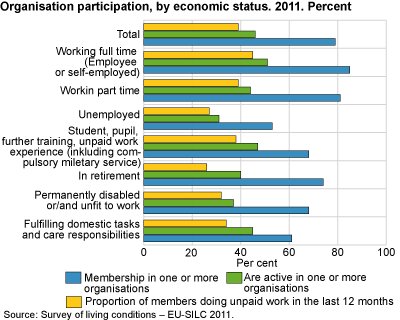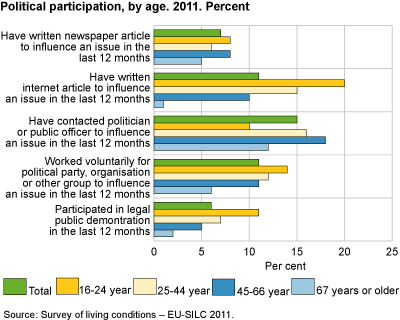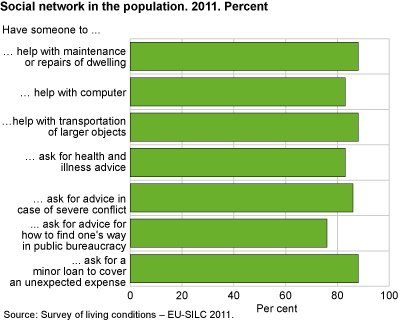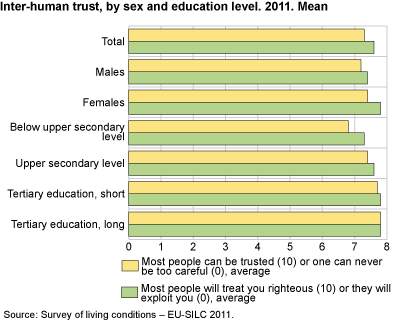Content
Published:
This is an archived release.
4 out of 10 doing unpaid work
Among the Norwegian population, nearly 80 per cent are members of an organisation, and almost half the population are active members. Almost 40 per cent of the population have done unpaid work for organisations during the last year.
The Survey of living conditions 2011 examines organisation activity and membership in organisations, political participation and social networks, and inter-human trust and religious affiliation. The results indicate a high level of activity, strong social ties and that we have great trust in each other.
Permanently disabled people do a lot of unpaid work
In total, 79 per cent of the population are members of an organisation and 46 per cent are active members. Half of the population are members of two organisations or more, and 16 per cent are active members. People living in sparsely populated areas are more active than those living in more densely populated areas. The unemployed, disabled and those retired are less active in organisations than those in employment. The higher the education, the higher the share of active members.
Unpaid work for organisations is carried out by 39 per cent of the population, with an average of 79 hours of unpaid work a year. The share of people doing unpaid work for organisations increases with higher education. Notwithstanding, those with the highest education perform the least unpaid work in a year (65 hours). Even though relatively few disabled persons are active in organisations, 32 per cent do voluntary work for organisations, with an average of 137 hours each.
Athletic clubs are the most popular organisations, with most active members. Sixteen per cent have done unpaid work for athletic clubs in the last year.
15 per cent have contacted a politician or public officer
In order to influence an issue, various types of political action may be taken. The most popular one, especially among people aged 45-66 years, is to contact a politician or public officer. Fifteen per cent of the population have done this in the last year, and 18 per cent among the middle aged. The younger generation uses the Internet (20 per cent) or does voluntary work for organisations (14 per cent) to influence different issues. As in the last few years, only 8 per cent of the population are members of a political party.
Social networks - a source of advice and help
Social networks are characterised as a source for personal resources. Most people have someone to ask for practical help with maintenance or repairs of dwelling (88 per cent), help with computer problems (83 per cent) and someone to help with the transportation of larger objects (88 per cent). Eighty-three per cent also have someone to ask for advice on health and illness, 86 per cent have someone to ask for advice in the event of a severe conflict, while 76 per cent have someone to ask for advice on how to navigate their way in public bureaucracy.
Women have more trust in their fellow citizens
We have tried to measure the inter-human trust in Norwegian society through two questions. In the first one we ask the interviewee to state, on a scale from 0 to 10, if most people can be trusted (10) or if one can never be too careful (0). The average score is 7.3. In the other question, we ask the person to evaluate whether people will treat you fairly (10) or will exploit you (0). The average score on this question is 7.6. Other surveys show that the trust in Norway, and the other Nordic countries, is relatively high compared to other European countries (European Social Survey 2010).
Women score higher on both indicators of trust than men, and among both sexes the inter-human trust is highest among those aged 45-66 years.
Fifty-five per cent of the population belong to a religion or denomination, with a higher share of women (60 per cent) than men (51 per cent). Of those who consider themselves religious, 18 per cent attend a service or religious meeting at least once a month.
Reference:
Find more figures
Find detailed figures from Activity in organisations, political participation and social networks, survey on living conditions
Contact
-
Håvard Bergesen Dalen
E-mail: havard.dalen@ssb.no
tel.: (+47) 40 90 23 50




